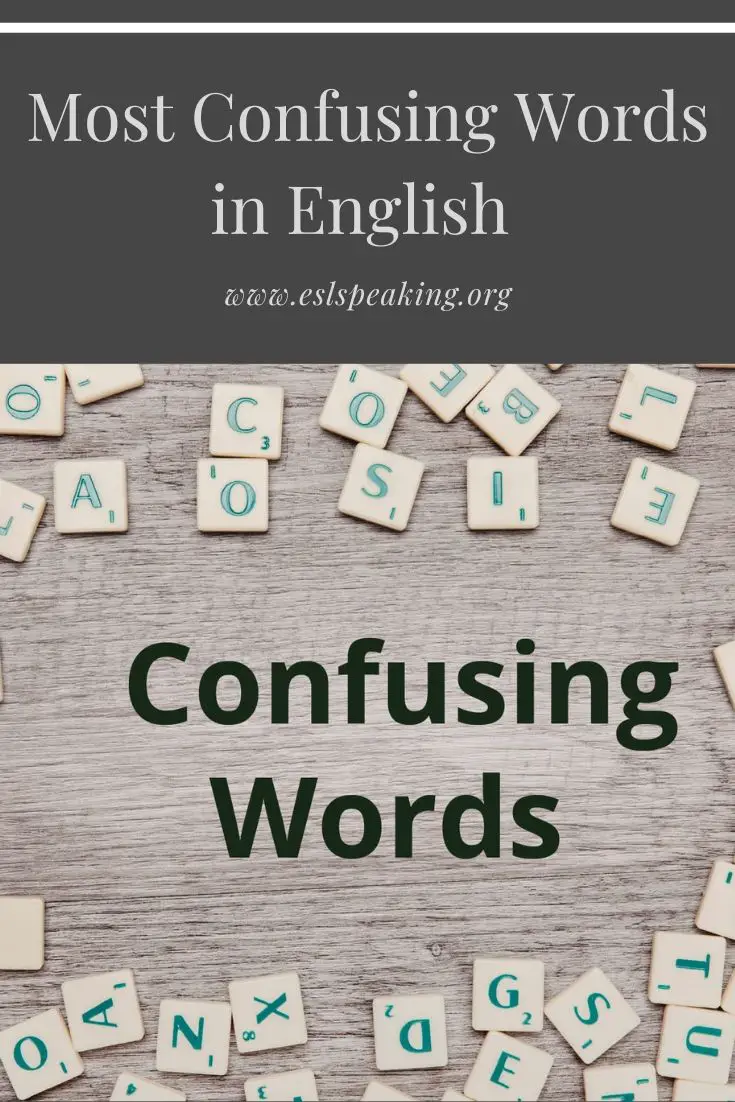If you’re looking for some help with confusing words in English, then you’re certainly in the right place. We’re going to bring you the word pairs in English that even native speakers have a difficult time with. Along with the most easily confused English words. Keep on reading!

Most confusing English words
Confusing Words in English
Here are some of the most confusing words in English that you should be aware of.
- Amazon Kindle Edition
- Bolen, Jackie (Author)
- English (Publication Language)
- 319 Pages - 03/14/2022 (Publication Date)
Irregardless
Is irregardless even a word? Shouldn’t we just use regardless instead? All the answers to those questions can be found right here:
They’re, There, and Their
Even native English speakers get these words confused! They are homophones that sound the same but have very different grammatical contexts. Find out everything you need to know here:
Little, a Little, and Small
There are certainly some subtle differences in how you use each of these words. Check out this article to find out:
Poor, Pore, Pour
These words are homophones but they have very different uses and meanings in English. Clear up any confusion right here:
Confusing Word Pairs
Here are some of the pairs of words that a lot of people get confused in English, even native speakers! Learn the differences between these words and ace that next TOEFL, TOEIC, or IELTS exam that you’re taking.
Already vs All Ready
Do you know the difference between these confusing words? And, is allready really a word? Find that out here:
Affect vs Effect
Even native English speakers get these words confused! Have a look here to find out all the details you need to know:
Averse vs Adverse
These words are tricky because they both mean in opposition and they sound similar. However, there are some key differences that you need to be aware of:
Access vs Excess
These words sound so similar but have different forms and meanings. Have a look here:
Later vs After
In some cases, you can only use one of these words in a sentence where other times, either one will fit! That’s what makes them so tricky. Find out all the details:
- Amazon Kindle Edition
- Bolen, Jackie (Author)
- English (Publication Language)
- 319 Pages - 03/14/2022 (Publication Date)
Accept vs Except
These words are homophones (sound the same) in most cases (depending on who is talking!). They do have quite different meanings which you should be aware of. Check it out:
Advice vs Advise
Even native English speakers don’t know when to use advice or advise. It’s confusing! Not to worry. Help can be found right here:
Want to See ALL the Confusing Words in English?
- Amazon Kindle Edition
- Bolen, Jackie (Author)
- English (Publication Language)
- 319 Pages - 03/14/2022 (Publication Date)
Yes? Thought so. Then you’re going to want to pick up a copy of this book: Most Confusing Words in English Explained. You’ll find hundreds of words and word pairs that even native English speakers sometimes feel confused about.
Pick up your copy of the book today and get ready for better English speaking and writing tomorrow:
Most Confusing Words in English FAQs
There are a number of common questions that people have about the most confusing words in English. Here are the answers to some of the most popular ones.
What’s the difference between “there,” “their,” and “they’re”?
“There” refers to a place, “their” shows possession, and “they’re” is a contraction of “they are.”
How do you distinguish “its” and “it’s”?
“Its” shows possession (belonging to “it”), while “it’s” is a contraction of “it is” or “it has.”
When should I use “affect” and “effect”?
“Affect” is typically a verb meaning to influence, while “effect” is usually a noun meaning result or outcome.
Can you explain “fewer” and “less”?
“Fewer” is used with countable nouns (individual items), and “less” is used with uncountable nouns (mass nouns).
What’s the distinction between “then” and “than”?
“Then” refers to time or sequence, while “than” is used for making comparisons.
How do you differentiate “accept” and “except”?
“Accept” means to receive or agree, while “except” means to exclude or leave out.
When should I use “who” and “whom”?
Answer: “Who” is used for the subject of a sentence, and “whom” is used for the object of a verb or preposition.
What’s the difference between “loose” and “lose”?
“Loose” means not tight or secure, while “lose” means to misplace or be unable to find.
Explain “your” and “you’re.”
“Your” shows possession (belonging to “you”), and “you’re” is a contraction of “you are.”
Can you clarify “it’s” and “its”?
“It’s” is a contraction for “it is” or “it has,” while “its” shows possession (belonging to “it”).
What’s the difference between “stationary” and “stationery”?
“Stationary” means not moving, while “stationery” refers to paper and writing materials.
How do you use “complement” and “compliment”?
“Complement” means something that completes or goes well with another thing, while “compliment” is a positive expression of praise.
Explain the difference between “farther” and “further.”
“Farther” relates to physical distance, while “further” is often used to indicate additional or more advanced.
How should “who’s” and “whose” be used?
“Who’s” is a contraction of “who is” or “who has,” while “whose” shows possession.
What’s the distinction between “principal” and “principle”?
“Principal” can refer to a person in a leadership role or the main amount of money, while “principle” refers to a fundamental belief or rule.
Join the Conversation about Confusing English Words
Do you have any words or word pairs that you’d like us to talk about? Or, a tip for remembering the difference between any of these words? Please leave a comment below and let us know.
Also, be sure to give this article a share on Facebook, Pinterest, or Twitter. It’ll help other people looking to improve their English grammar and vocabulary find this resource.
Last update on 2025-05-14 / Affiliate links / Images from Amazon Product Advertising API







Leave a Reply